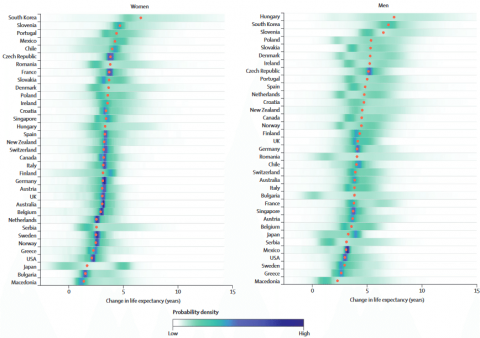Life expectancy at birth will continue to climb substantially for residents of industrialized nations — but not in the United States, where minimal gains will soon put life spans on par with those in Mexico and the Czech Republic, according to an extensive analysis released Tuesday.
South Korean women and Hungarian men are projected to make the largest overall gains (with South Koreans second among males). There is a better-than-even chance that South Korean women will live to an average of 90 years old by 2030, which would be the first time a population will break the 90-year barrier, according to the research published in The Lancet.
Not so in the United States. “Notable among poor-performing countries is the USA,” the researchers wrote, “whose life expectancy at birth is already lower than most other high-income countries, and is projected to fall further behind, such that its 2030 life expectancy at birth might be similar to the Czech Republic for men, and Croatia and Mexico for women.”

Countries are listed by median projected increase in life expectancy, largest to smallest, from 2010 to 2030. The red dots show the median increase at the end of that period. (Source: The Lancet)
Americans will gain only a couple of years of life expectancy between 2010 and 2030, the study predicted, keeping life spans in the early 80s for women and late 70s for men. The study projects a life expectancy of 83.3 for women in the United States and 79.5 for men in 2030, up from 81.2 for women and 76.5 for men in 2010.
The reasons for the United States' lag are well known. It has the highest infant and maternal mortality rates of any of the countries in the study, and the highest obesity rate. It is the only one without universal health insurance coverage and has the “largest share of unmet health-care needs due to financial costs,” the researchers wrote.





















